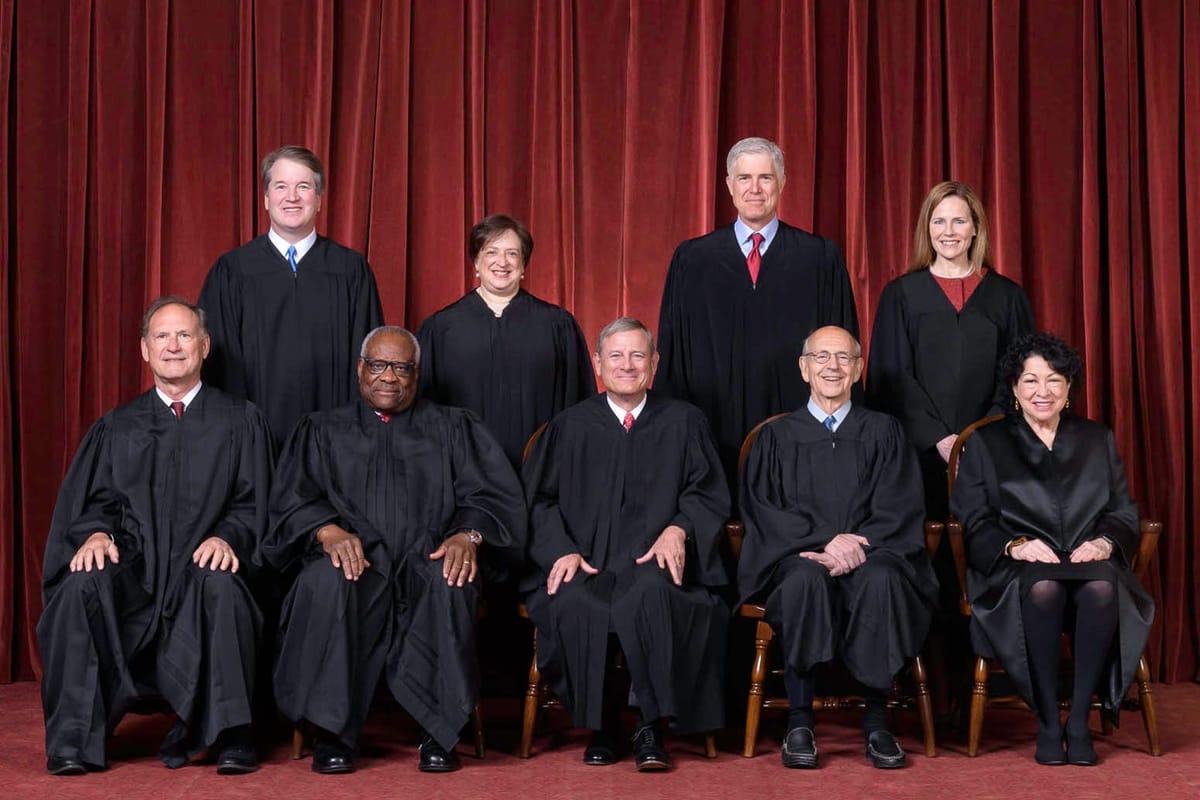Indignity Vol. 2, No. 31: The slippery slope of history.
CONTESTED JUDGMENT DEP'T.

How Constitutional Is Gay Marriage?
POSSIBLY THE MOST dangerous belief about American history, and among the most popular, is that the nation has a natural tendency to correct its errors and to improve over time—that the simplest summary of American history is that, yes, some things were bad before, but gradually they got better. People still want to believe this, even knowing that after 44 previous presidencies, the country elected Donald Trump.
The central example of this is the general public unfamiliarity with the story of how Reconstruction was dismantled, when the once-defeated forces of slavery rallied to snuff out multiracial democracy and replace it with Jim Crow law. Guided by a propaganda campaign from Confederate-friendly white historians, from the late 19th century through most of the 20th, the majority of American schoolchildren learned that the new postwar order had collapsed on its own merits, rather than being destroyed by terrorism and insurrection.
As Republican state legislatures scurry to outlaw whatever ideas and subjects they can brand as "Critical Race Theory," the old story is being revived. But it has always had a liberal constituency, too. If you think that Jim Crow was simply an unfortunate intermediate evolutionary stage between slavery and modern civil rights—rather than a violent reversal of rights already gained—it's easier to believe that progress is inexorable, and that the world has always been heading the way you want it to go.
This brings up the question of gay marriage. Is it a question? Most people seem to assume that it's a settled matter. In Windsor v. United States, and then in Obergefell v. Hodges, the Supreme Court struck down laws restricting marriage to man-woman pairings, and recognized the equality of same-sex bonds with all others. Gay rights were protected by the Constitution. The march of liberty had reached another milestone. Couples went out and got married.
But constitutionality is an expression of people's political expectations. And the Supreme Court is people—"lawyers who happen to hold commissions authorizing them to resolve legal disputes," as one person put it, disparagingly. Specifically, the person who described the court that way was Chief Justice John Roberts, in 2015, in his dissent against the Obergefell decision.
Marriage equality is constitutional because in 2015 five people voted that it was, while only four people voted that it wasn't. Of the five justices in that majority, one is dead, one is in retirement, and another is about to retire. Of the four in the minority, three are still on the bench, and two of those—Samuel Alito and Clarence Thomas—have declared that they still oppose the decision.
Where would that leave the vote tally, if the court were considering Obergefell today? There would be two remaining votes for it, presumptively joined by the newly confirmed Ketanji Brown Jackson. That makes three. There would be two confirmed votes against.
What about the chief justice? In the seven years since Obergefell, as the court has been stacked with enthusiastic new right-wing justices, Supreme Court analysts have embraced the idea that Roberts sees it as his duty to defend the reputation of the institution against the appearance of partisanship. Facing certain moments of crisis—the attempt to throw out the Affordable Care Act, the runaway use of the shadow docket to make unexplained decisions—Roberts has chosen institutional conservatism over partisan conservatism, and sided with the liberals. Would he set aside his former complaints that "the core definition of marriage" excluded same-sex couples or that the Obergefell decision was "indefensible as a matter of constitutional law," in favor of the principle of stare decisis?
Even if Roberts were to choose to support precedent over his previously announced beliefs, that would bring the number of justices defending marriage equality to four. Who would be a fifth? Amy Coney Barrett, under direct questioning in her confirmation hearing, avoided affirming that Obergefell was properly decided. Brett Kavanaugh did the same. Neil Gorsuch, soon after joining the court, wrote a dissent (supported by Alito and Thomas) when the court ordered Arkansas, under the equality rights established by Obergefell, to recognize same-sex parents on birth certificates.
Maybe Gorsuch, who did write one major decision supporting gay and trans civil rights, would protect Obergefell. Maybe his fellow Trump appointees would balk at doing something so drastic. But it's not possible, looking at the present court, to name five certain votes to uphold something everyone treats as a settled right.
The Voting Rights Act seemed to be settled, too: a monument to the bipartisan commitment to upholding the gains of the '60s. With the Roberts Court methodically stripping away its essential provisions, and with Republicans seeing an opportunity to block Democratic voters, it has become impossible to pass a reinforced voting rights bill. Right-wing Democratic senators, bent on protecting the filibuster, agree with Republicans that the whole subject is too divisive to pursue.
The political climate—that is, the constitutional climate—is not what it was seven years ago, or a year ago. It's not even what it was two weeks ago. When the Supreme Court allowed Texas' aggressive antiabortion law to remain in effect this past September, pending appeal, it claimed to be making a technical distinction: that the law's workaround for Roe v. Wade, delegating the work of suppressing abortion to vigilante lawsuits by private citizens, rather having the government directly enforce a ban, was so novel it deserved to be sorted out through the courts.
In fact, the court was ending Texans' constitutional right to abortion. What its rulings on the Texas law announced, and what its intended audience heard, was that states didn't have to wait for Roe to be overturned before they could start violating its protections. Law was beside the point; local authorities arrested a woman in Texas for inducing her own abortion, only releasing her after reporters and activists noticed and pointed out that she hadn't violated any existing statutes.
With the Supreme Court declaring open season, half a century of jurisprudence is now up for reconsideration. And not just about abortion. The present frenzy of right-wing lawmaking—against "Critical Race Theory," against accommodations for trans children, against mentioning same-sex relationships in school—is meant to reverse the entire liberal idea of ever-advancing rights and progress.
People are reviving positions they would have been embarrassed to stake out when Antonin Scalia was still alive on a 5–4 court. Indiana senator Mike Braun, answering a reporter's questions about the Jackson confirmation, got so caught up arguing against the Supreme Court's power to restrict state measures that he said it should have upheld the interracial marriage ban in Loving v. Virginia. (A few hours later, Braun said he "misunderstood" the question, despite having methodically answered a follow-up.)
Rights are a moving target, and tolerance extends only as far as intolerance is able to set the limits. The right-wing messaging entrepreneur Chris Rufo has pushed his campaigning from attacks on "Critical Race Theory" to attacks on trans rights to outright gay-baiting, and Republicans have followed his lead. In the span of a few weeks, it's become mainstream political behavior to call defenders of gay rights "groomers"—on the grounds that if schools acknowledge gay people's existence, they are recruiting children into gayness, because to be gay is to be a potential pedophile. (Andrew Sullivan, who cheered the backlash against Black people and trans people, was shocked to see Rufo continue doing exactly what he'd been doing all along.)
The political possibilities are mutating in real time. This week, the usually crypto-reactionary Ross Douthat wrote a column in the New York Times which he professed to be weighing and exploring all sides of the present argument over trans rights—only to suddenly renounce, at the end, his own "conflict-avoidance, shading into cowardice" and declare (via a prediction about a hypothetical future judgment of history) that posterity will view the current state of treating children who identify as trans as "a grave medical-political scandal"
Before he got to that point, he expressed another opinion—this one not attributed to future generations who would agree with him, but in the more traditionally evasive Douthat-ian manner to some other people: not himself, but not NOT himself, really. In the midst of his description of the group of people most resistant to trans rights, he took a sudden dive into parentheses:
It obviously includes social and religious conservatives, to whom recent cultural trends feel like vindication of their original anxieties about the push for same-sex marriage. (If conservatives had predicted just before Obergefell v. Hodges that soon a fifth of young adults would identify as L.G.B.T.Q., prominent voices would deploy terms like ‘“pregnant person” and “menstruator” in place of “woman,” and natal males would be winning women’s track and swimming competitions, they would have been treated as hysterics.)
Here was the old slippery-slope argument against marriage equality, brought back in the New York Times in 2022. If you grant that Obergefell set off a social cascade toward a "grave medical-political scandal," then what would reversing that scandal look like?

VISUAL CONSCIOUSNESS DEP’T.
Easter

More consciousness on Instagram.

SANDWICH RECIPE DEP’T.
WE PRESENT instructions for the assembly of sandwiches from Salads, Sandwiches and Chafing Dish Recipes, Copyright 1916, now in the public domain for the delectation of all, written by Marion Harris Neil, M.C.A., former Cookery Editor, The Ladies’ Home Journal, author of How to Cook in Casserole Dishes, Candies and Bonbons and How to Make Them, Canning, Preserving and Pickling, and The Something-Different Dish.
SAVORY CREAM SANDWICHES
1 gill (1/2 cup) whipped cream
2 teaspoonfuls anchovy extract or shrimp paste
1 teaspoonful finely chopped parsley
Unbuttered bread
Salt and pepper to taste
Beaten egg-white or liquid aspic jelly
Paprika
Mix the cream with the anchovy extract, parsley, [and] salt and pepper to taste. Spread on slices of unbuttered bread and cut into squares or triangles; brush the edges with beaten white of egg or liquid aspic jelly, and dust these with chopped parsley and paprika.
If you decide to prepare and enjoy this sandwich, kindly send a picture to us at indignity@indignity.net.





